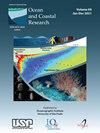Vertical structure and variability of currents on the southern Brazilian inner shelf at 32°S
IF 1
4区 地球科学
Q3 MARINE & FRESHWATER BIOLOGY
引用次数: 0
Abstract
This study investigates the impact of winds, tides, and river discharges on the coastal current and salinity variability of Southern Brazil’s inner shelf. Data on wind speed, current, surface salinity, and temperature were collected for analysis from a metocean buoy of the Brazilian Coastal Monitoring System (SiMCosta). The observed current time series can be interpreted as a sum of highly variable flows correlated with local wind stress, and a residual mean current flowing southward along the coast at a few centimeters per second. Tidal currents were predominantly diurnal, albeit negligible, representing approximately 1.7% of the current variance in the region. We observed a prevalence of northwest winds and southeastward currents on the inner shelf, as well as an intermittent flow in both the alongshore and cross-shore directions due to meteorological frontal system passages. The power spectrum of both current components presented similar frequency patterns, indicating the prevalence of high-energy events in periods of 3 to 10 days over the entire time series. The alongshore current is highly correlated (r=0.73, p<0.05) with alongshore wind and a delay of 3 hours. In the low- (period >40 h) and high-frequency (period <40 h), the temporal lags were of 5 and 3 hours, respectively, with correlations of 0.79 (p<0.05) and 0.60 (p<0.05). The wavelet analysis has shown that high-energy events in alongshore wind stress are more common between August and October and less often between February and March, with similar surface currents and salinity patterns. A decrease in surface salinity during the winter season was observed due to the high level of Patos Lagoon’s outflow. Mean daily salinity correlated negatively with Patos Lagoon’s outflow, however part of this variability is associated with the intrusion of Patos Lagoon’s plume and the passage of frontal systems.32°S巴西南部内陆陆架的垂直结构和洋流变化
本研究调查了风、潮汐和河流流量对巴西南部内陆大陆架沿岸洋流和盐度变化的影响。从巴西海岸监测系统(SiMCosta)的海洋浮标上收集风速、海流、表面盐度和温度等数据进行分析。观测到的海流时间序列可以解释为与当地风应力相关的高度可变流的总和,以及沿海岸以每秒几厘米的速度向南流动的残余平均海流。潮汐流主要是日流,尽管可以忽略不计,约占该地区洋流变化的1.7%。我们观察到内陆架上普遍存在西北风和东南流,以及由于气象锋面系统通道导致的沿岸和跨海岸方向的间歇性流动。两种电流分量的功率谱呈现出相似的频率模式,表明在整个时间序列中,高能事件的流行周期为3至10天。沿岸流与高频(周期<40 h)高度相关(r=0.73, p40 h),时间滞后分别为5 h和3 h,相关性分别为0.79 (p<0.05)和0.60 (p<0.05)。小波分析表明,沿海风应力的高能量事件在8月至10月期间更为常见,在2月至3月期间较少,具有相似的表面海流和盐度模式。由于帕托斯湖的高流出量,在冬季观测到表面盐度下降。平均日盐度与帕托斯泻湖的流出量呈负相关,但这种变化部分与帕托斯泻湖羽流的侵入和锋面系统的通过有关。
本文章由计算机程序翻译,如有差异,请以英文原文为准。
求助全文
约1分钟内获得全文
求助全文

 求助内容:
求助内容: 应助结果提醒方式:
应助结果提醒方式:


